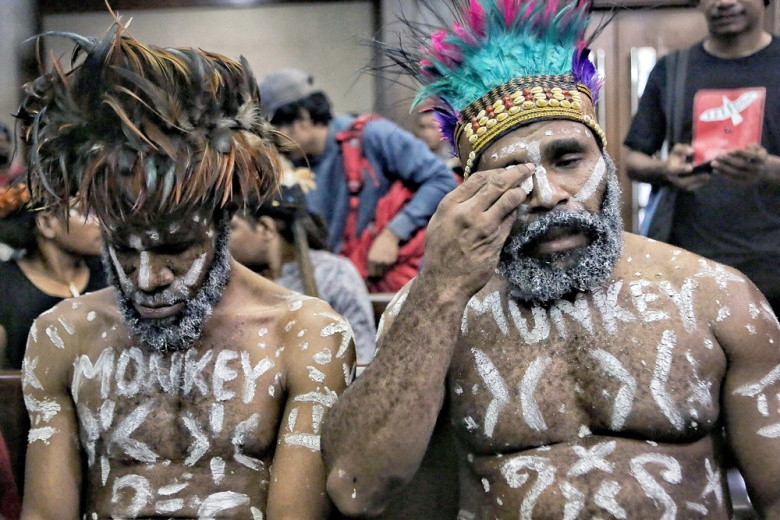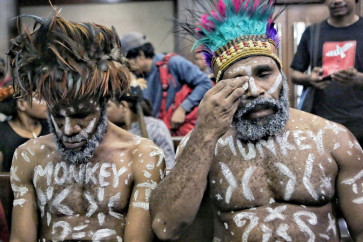Popular Reads
Top Results
Can't find what you're looking for?
View all search resultsPopular Reads
Top Results
Can't find what you're looking for?
View all search results2020: A year of meaningful diplomacy over Papua?
With Papuans’ increasing commitment to realizing peace with justice in their homeland, the time has come for Indonesia to act swiftly and decisively over the issues that are important to Papuans.
Change text size
Gift Premium Articles
to Anyone
 Marginalized: Wearing traditional headdress, Papuan human rights activists Dano Tabuni (right) and Ambrosius Mulait wait for the start of their trial at the Central Jakarta District Court. The two face charges of treason for flying the Bintang Kejora (Morning Star) flag during a rally outside the State Palace last August. (JP/Seto Wardhana)
Marginalized: Wearing traditional headdress, Papuan human rights activists Dano Tabuni (right) and Ambrosius Mulait wait for the start of their trial at the Central Jakarta District Court. The two face charges of treason for flying the Bintang Kejora (Morning Star) flag during a rally outside the State Palace last August. (JP/Seto Wardhana)
T
he year 2020 dawns with President Joko “Jokowi” Widodo’s continued blatant avoidance of human rights violations and willful ignorance of West Papuans’ right to self-determination. But with Papuans’ increasing commitment to realizing peace with justice in their homeland, the time has come for Indonesia to act swiftly and decisively over the issues that are important to Papuans.
The next 12 months will determine whether Jokowi’s multi-party coalition is capable of finalizing the timing of the visit of the United Nations high commissioner for human rights (currently Michelle Bachelet), which aims to address the Nduga humanitarian situation, and of entering into a third-party mediation with Papuan independence leaders for a peaceful resolution to the ongoing conflict in the territory.
These events are pivotal as they will make or break Jakarta’s diplomacy over West Papua in the coming decade.
Indonesia has in principle committed to granting the UN Human Rights Office access to Papua. But little progress toward this end is apparent. Despite issuing an invitation to the office in February 2018 to visit the territory, the government flounders when it comes to setting an actual date. Invitations mean nothing until genuine action is taken. Jakarta still maintains, contra to the evidence, that economic development in Papua is the solution to the human rights crisis. It is a stalemate.
Overcoming the requires courage, and courage requires action from Jokowi, rather than the willful blindness toward Papua that he has so far shown during his presidency, which is flailing under the influence of nationalist heavyweights — Indonesia’s oligarchs, political elites, and the national security apparatus.
But if a date is set during Jokowi’s presidency for the UN visit, this will soften decades worth of persistent criticism of human right violations in Papua, violations that include suppression of political dissent, torture, extrajudicial killings and systemic police and military violence.
It will also go some way toward improving Indonesia’s global standing. Pacific leaders, including those in Australia and New Zealand, have urged Jakarta to set a clear timeframe for the UN visit to Papua to address allegations of human rights violations and the root causes of the conflict.

















